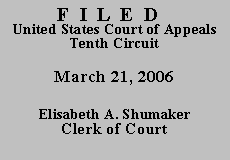

| VICKI ARIATTI, sovereign citizen for
the State of Colorado,
v.
VICKI JO EDWARDS |
|
Plaintiff-Appellant Vicki Ariatti, a resident of Lamar, Colorado, was cited and fined $85.00 for speeding and driving a vehicle without using her safety belt. On August 17, 2005, Municipal Court Judge Vicki Edwards issued a bench warrant for Ms. Ariatti's failure to pay or appear in connection with the citation. On September 30, 2005, Ms. Ariatti filed a pro se complaint under 42 U.S.C. § 1983 in the District of Colorado and was granted leave to proceed in forma pauperis. See 28 U.S.C. § 1915. In her complaint, Ms. Ariatti alleges that Judge Edwards violated her First, Fourth, Fifth, Sixth, Seventh, Eighth, Ninth, and Tenth Amendment rights when she issued the warrant. The District Court dismissed Ms. Ariatti's complaint as legally frivolous under 28 U.S.C. § 1915(e)(2)(B)(i) because Judge Edwards is entitled to judicial immunity. We take jurisdiction under 28 U.S.C. § 1291 and AFFIRM.
Under § 1915(e)(2)(B)(i), the District Court was required to dismiss Ms. Ariatti's complaint if the court determined "that the action or appeal is frivolous or malicious."(1) A legally frivolous claim is one in which the plaintiff asserts legal or factual points that are not arguable on their merit. See Neitzke v. Williams, 490 U.S. 319, 325 (1989). There is some uncertainty regarding the proper standard of review when a district court dismisses a complaint pursuant to §1915 (e)(2)(b)(i). Specifically, we have questioned whether a de novo or an abuse of discretion standard is appropriate for such cases after the Prison Litigation Reform Act of 1995 altered the language in that subsection. See Lowe v. Sockey, 36 Fed. App'x 353, 2002 WL 491731, at *2 (10th Cir. Apr. 2, 2002) (unpublished); Basham v. Uphoff, 1998 WL 847689, at *4 n. 2 (10th Cir. Dec. 8, 1998) (unpublished). In the present case, however, we need not decide which standard of review is appropriate because we would reach the same conclusion under either standard.
The crux of Ms. Ariatti's complaint is that she is a sovereign state citizen bound only by common law, and that Judge Edwards violated her right to due process and acted outside of her judicial capacity by fining her and issuing a warrant for her arrest. Ms. Ariatti asserts that a number of her constitutional rights have been violated by this fine and arrest warrant for nonpayment as she has "no contract with state and federal government" and there is "no lawful money in circulation" with which she could pay the fine. Ms. Ariatti seeks $20,000 in monetary damages.
It is clear that Ms. Ariatti's claims regarding her status as a state citizen, her lack of a contract with state and federal governments, the lack of lawful money in circulation, and her assertion that a number of her constitutional rights have been violated are without merit and are legally frivolous.(2) Furthermore, Judge Edwards enjoys absolute immunity from liability in civil rights suits for monetary damages for actions taken in her official capacity as a judge, see Hunt v. Bennett, 17 F.3d 1263, 1266 (10th Cir. 1994), which further highlights the lack of merit to Ms. Ariatti's claims. The motion to proceed in forma pauperis is therefore denied and the appeal is dismissed.
ENTERED FOR THE COURT,
Deanell Reece Tacha
Circuit Judge
*.This order and judgment is not binding precedent, except under the doctrines of law of the case, res judicata, and collateral estoppel. This court generally disfavors the citation of orders and judgments; nevertheless, an order and judgment may be cited under
1.We also note that subsection (e)(2)(b)(iii) provides for dismissal of a case when the plaintiff "seeks monetary relief from a defendant who is immune from such relief." Because the district court focused on the frivolity of these claims, however, we limit our discussion to that issue alone.
2.As the District Court pointed out, even if Ms. Ariatti's claims were found to have merit, her suit is likely precluded by Heck v. Humphrey, 512 U.S. 477 (1994). In Heck, the Supreme Court held that if a judgment for damages favorable to a prisoner in a § 1983 action would imply the invalidity of the prisoner's conviction or sentence, the § 1983 action cannot arise until the conviction or sentence has been reversed on direct appeal, expunged by executive order, declared invalid by an authorized state tribunal, or called into question by the issuance of a federal habeas writ. 512 U.S. at 486-487.